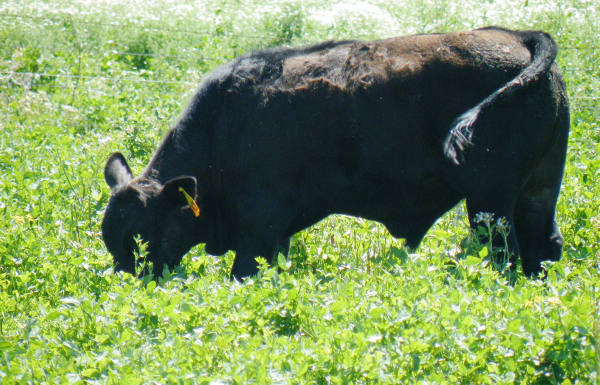March 6, 2012

It’s a big shift from worrying about not enough forage to worrying about too much and the resulting cattle-bloat issues, noted Texas AgriLife Extension Service personnel, but that’s what’s happening in some parts of the state.
Winter wheat and cool-season forages continued to greatly improve thanks to more rain during early March, lessening the need for feeding expensive hay, according to weekly reports from AgriLife Extension county agents.
“Calving season is in full swing,” said Missy Hodgin, AgriLife Extension agent for Clay County, east of Wichita Falls. “Cows are in decent condition. Bloat is a big concern, especially with cows and calves on wheat pasture. Some producers are reporting death loss to bloat as high as 10 percent.”
“Dry and windy conditions the past week have farmers in the fields planting,” said Pasquale Swaner, AgriLife Extension agent for Falls County, southeast of Waco. “Bloat on cattle has been reported due to all the clover growing.”
“Weeds are becoming a problem this year, bloat due to over-consumption of clover is a great concern,” said Steve Sturtz, AgriLife Extension agent for Tom Green County, San Angelo. “Yearling cattle were doing very well on small grains, and cows are regaining body condition where winter grasses are available.”
“Overall pasture conditions continue to improve as soil moisture increases, and livestock condition has seen dramatic improvement in recent months,” said Michael Haynes, AgriLife Extension agent for Caldwell County, south of Austin. “However, due to substantial forage loss from drought and overgrazing in the previous year, many pastures are seeing excessive clover growth, leading to producers having to purchase bloat preventatives. Some producers have been experiencing livestock loss due to bloat and tetany.”
“Fields are still a little wet to plant; getting close though,” said Travis Franke, AgriLife Extension agent for Guadalupe County, east of San Antonio. “Clover abundance in pastures is causing some problems with bloat, but pastures have been recovering nicely with recent rains.”
More information on the current Texas drought and wildfire alerts can be found on the AgriLife Extension Agricultural Drought Task Force website at http://agrilife.tamu.edu/drought/.
You May Also Like




